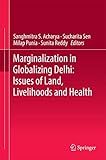Marginalization in globalizing Delhi : issues of land, livelihoods and health / Sanghmitra S. Acharya, Sucharita Sen, Milap Punia, Sunita Reddy, editors.
Material type: TextPublisher: New York, NY : Springer Berlin Heidelberg, 2016Description: xxxix, 465 pages : color illustrations ; 25 cmContent type:
TextPublisher: New York, NY : Springer Berlin Heidelberg, 2016Description: xxxix, 465 pages : color illustrations ; 25 cmContent type: - text
- unmediated
- volume
- 9788132235811 (hbk.)
- 23 363.70954 MAR 010887
| Item type | Current library | Call number | Status | Date due | Barcode |
|---|---|---|---|---|---|
 Book
Book
|
Indian Institute for Human Settlements, Bangalore | 363.70954 MAR 010887 (Browse shelf(Opens below)) | Available | 010887 |
Chapter 1. Introduction: Land, Livelihoods and Health: Marginalization in Globalizing Delhi --
Part I: Land and Changing Landscape --
Chapter 2. ELand-use Dynamics of Peri-Urban Areas of Metropolitan Cities With Special focus on Delhi --
Chapter 3. Urban Form and Regional Development of National Capital Region --
Chapter 4. Marginalization and Socio-Ecological Transformation in New Urban Peripheries: A Case Study of Gurgaon --
Chapter 5. Ecosystem Services in NCT Delhi --
Chapter 6. Examining Equity in Spatial Distribution of Recreational and Social Infrastructure in Delhi --
Chapter 7. Land Acquisition Policy and Praxis: the Case of Peri-Urban Delhi --
Part II: Livelihoods and Vulnerability --
Chapter 8. Neo-Liberal Urbanization, Work Participation and Women: Comparing the Urban and Peri-Urban Contexts of Delhi with Mumbai and Kolkata --
Chapter 9. Embedded or librated? An exploration into the social milieu of Delhi --
Chapter 10. Gender Violence in Delhi: Perceptions and Experience --
Chapter 11. Migrant Women Workers in Construction and Domestic work: Issues and Challenges --
Chapter 12. Revealing Vulnerabilities of People and Places of Delhi --
Chapter 13. Vulnerabilities of Relocated Women: A Case of Resettlement Colony of Bawana, Delhi --
Chapter 14. Social Vulnerability Mapping for Delhi --
Part III: Health and Public Amenities --
Chapter 15. Disrupted Megacities and Disparities in Health Care --
Chapter 16. Changing Health Care Dynamics: Corporatization and Medical Tourism in Mega cities --
Chapter 17. Heath Care Providers in Delhi Metropolitan Cities --
Chapter 18. Access to Maternal and Child Health Care: Understanding Discrimination in Selected Slum in Delhi --
Chapter 19. Life on Streets: Health and Living Conditions of Children in Delhi --
Chapter 20. Socio-Economic Disparities among Youth in Delhi: Issues and Challenges --
Chapter 21. Condition of the aged in National Capital Territory of Delhi --
<Chapter 22. Water and Sanitation and Public Health Issues in Delhi --
Chapter 23. Solid Waste Management and Health of Workers --
Chapter 24. Living in Blight in the Globalized Metro: A Study on Housing and Housing Conditions in Slums of Delhi.
This book analyses how developmental projects in a globalizing Delhi have brought about neglect, exclusion and alienation of certain sections of population, while benefiting others. It discusses the physical, economic and social displacement of people in the city in recent times, which has deprived them of their lands, livelihoods and access to health care. In Delhi and the National Capital Region, beyond the obvious and apparent image of wide roads, flyovers, the metro rail network, high-rises and glittering malls, globalization has brought about skewed and uneven development. A growing middle class and a significant group of an extremely rich section of population steer the ways in which development strategies are planned and implemented. Furthermore, with government control reducing as is inevitable and consistent with a neoliberal policy framework, private players have entered not only the consumer goods sector, but also basic goods and services such as agriculture, health and education. This book explores the effects of such processes, with a specific focus on equity, on the marginalized sections of population in a globalizing megacity. It addresses the themes of land, livelihoods and health as overarching, drawing upon their interlinkages. It traces the changes in the growth of the city in context of these themes and draws inferences from their interconnectedness to examine the current situation of development in Delhi.


There are no comments on this title.